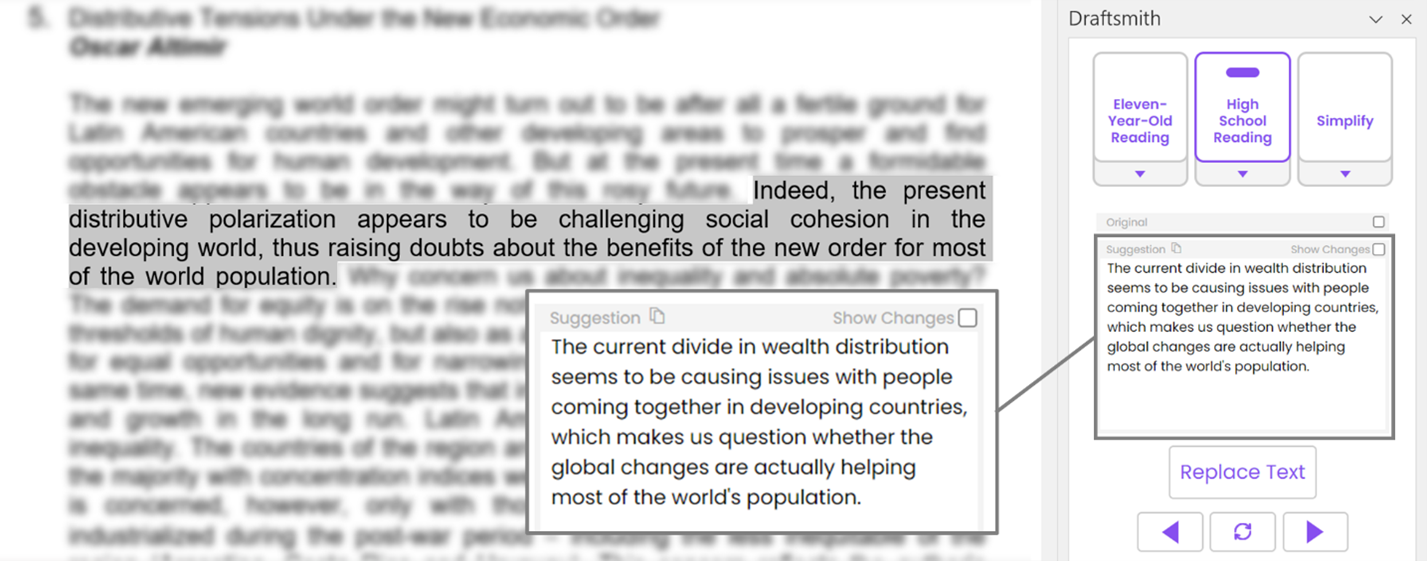Bridging Voices in Academic Publishing: Using AI to Work More Effectively with Multilingual Authors
The heart of editing
At the core of every editor's work lies a deeply personal commitment: to delicately refine the text while faithfully preserving the author’s original voice and vision. This commitment takes on even greater significance when supporting authors for whom English is an additional language, as it involves not just refining their words but also respecting their unique voice and cultural identity. It also introduces an additional layer of complexity.
Edits of texts by multilingual writers can be heavy, depending on the author’s level of English proficiency. It’s easy to misunderstand their intention or unintentionally erode their voice through personal biases or assumptions. It’s a delicate balancing act between preserving the diversity of multilingual writers’ expression and experience, and ensuring that writing is clear, relevant, and accessible for the audience. This article explores how AI can help editors working with multilingual authors.
Challenges for writers working outside their first language
Despite the existence of over seven thousand living languages worldwide, academic publishing predominantly uses English. This creates significant disadvantages for exophonic writers (those writing in a language that isn’t their first). No matter how brilliant the research, errors in grammar, spelling, or syntax can unfairly reduce the author’s credibility. Multilingual authors suffer rejection rates from journals that are more than twice as high as authors who grew up speaking English.
Is it OK to use AI on academic texts?
The use of AI in drafting and editing academic texts poses a complex debate. While an author’s research and writing must be original, it’s widely accepted that every writer benefits from editorial insight. Refining a piece of academic writing to reach its fullest potential necessitates numerous rounds of feedback and revisions. Using an AI writing refiner like Draftsmith for precise, sentence-level adjustments to an existing draft aligns with traditional editing processes. This stands in stark contrast to using AI for the initial generation of content. This crucial distinction points to the value of AI in academic editing as a tool for refinement and correction, rather than creation.
Where AI proves beneficial
Draftsmith's Fluency Enhancer
Academic writing demands accuracy, coherence, and clarity, which are areas where AI excels. AI also shines in its ability to adapt to the content's specific needs, from readability adjustments for various audience levels to discipline-specific citation formatting, saving hours of editing time.
Draftsmith, for example, can help with the following.
-
Simplify complex text and ensure that ideas flow logically in sentences.
-
Check for issues like subject-verb agreement and the correct use of articles and pronouns, which are frequent stumbling blocks for multilingual writers.
-
Detect and suggest adjustments for idiomatic expressions and figurative language, helping editors maintain cultural nuances while ensuring clarity for an international audience.
-
Suggest text adjustments for specific reading levels, making complex ideas accessible to the targeted audience.
Importantly, AI tools can help demystify texts quickly where linguistic differences obscure the original meaning. This ability to help pinpoint what the writer is trying to convey can be very useful for editors grappling with ambiguous sentences when they are up against tight deadlines. This in turn can help ensure that works are evaluated on their scholarly contributions rather than on English proficiency.
Draftsmith's Readability Tuner
AI's edge in deciphering text at speed
It may initially seem surprising that a tool like Draftsmith could pinpoint an author's intention in a sentence that even a seasoned editor, experienced with multilingual authors, finds perplexing. Yet this is precisely where AI excels, especially in situations where timelines are tight. Large language models (LLMs) like ChatGPT are grounded in natural language processing and machine learning, and so offer a sophisticated mix of linguistic understanding and detailed language insight. Trained on a broad array of languages and contexts, they are good at discerning the underlying intent of multilingual writers and ensuring their core message remains intact.
The human edge in everything else
While LLMs offer a broad linguistic perspective and help people to work at speed, human editors offer depth in cultural and linguistic understanding, catching subtle cultural nuances and culturally specific references that LLMs often miss. An editor's familiarity with the writer’s cultural background can further enhance the precise conveyance of these nuances. A human editor also understands the importance of valuing linguistic diversity over strict adherence to English standards, retaining expressions that reflect the author’s cultural identity. A human editor will collaborate closely with the author, not only to preserve their unique cultural expressions, but also to use the author’s diverse insights to enrich the work, such as the inclusion of local examples from the author’s region.
Working effectively with AI
The future of academic writing and editing with AI holds promise as a collaborative activity where AI complements human skill rather than supplanting it. Combining AI’s fast language capabilities with human editors’ deep cultural insights offers a valuable opportunity to make editing multilingual authors’ work easier and more effective.
Integrating tools like Draftsmith into academic writing and editing practices offers the opportunity for a supportive partnership that preserves the author's voice, navigates linguistic challenges, and increases efficiency. As academic writing and editing continue to evolve, the thoughtful use of AI can help to bridge language divides, level the playing field for academic authors, and enrich academia with texts that might otherwise have been rejected.


